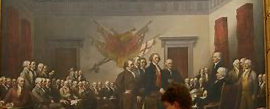
When the Constitution was politically negotiated, and ultimately voted into law, the United States was an agricultural community of separated areas. Since then, America has become a more diverse population and an industrialized economy. An industrial enterprise requires a different business plan than one which is agricultural and dependent upon weather.
The problem with updating and changing the Constitution is that those who must play a critical role for such a development are those who would likely lose power from such a change.
There is no longer a national need for 50 states, Congressional representatives, or 50 governments, employing and empowering 50 groups of benefited people.
Laws can now be approved by referendum and voting can be electronic. The activities of political parties and others seeking to influence voting can be directed at the voters.
Currently it appears that the role of political parties is zero sum in that it is only the passage or blocking of proposed legislation which is their goal. Collaborations for the common good seem to be viewed as a weakness of party loyalty and generally lack resolve.
WWII, the last “war” which Congress approved was the congealing result of our being attacked on December 7, 1941. What might be a necessary population congealing event prompting an updating and change in our Constitution? It is pending failure which prompts business owners and therefore business managers to change their business plans. Seeking better or different operational business plans seldom occurs when things are going well, because the normal attitude is: “leave it alone it’s all working”.
Inflation and resulting wage increases might cause a catalytic event, as could an attack by another country, though this is far less likely. Whatever it is, it will have to be dramatic, with lots of continuing media focus and attention. Without such an event it is difficult to believe that the population of the country would effectively demand a change.
This Constitutional change could embrace the country – redefining the Bill of Rights, and refocusing the details of governmental operation, resulting in a more effective, fairer, and less complex mechanism of management.
This seems like a good time for a Constitutional Convention of States (the first and only one was held in 1787). However, it is highly unlikely due to those with power being unwilling to do anything that would lessen the benefits they receive because of their power.
Arthur Lipper
